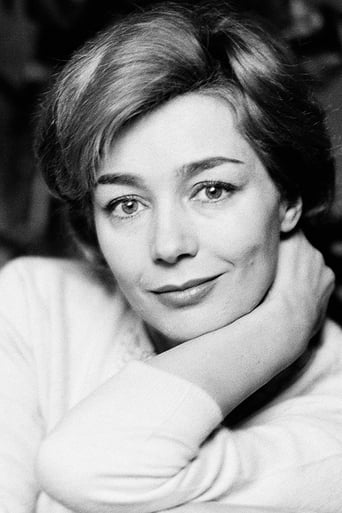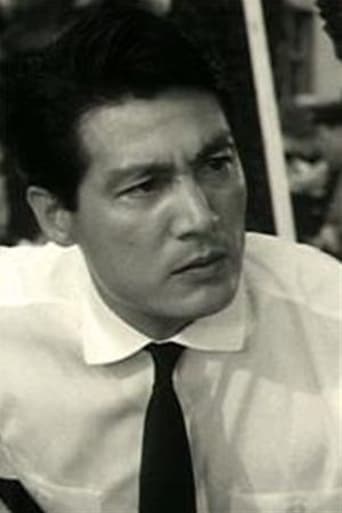Matrixston
Wow! Such a good movie.
Marketic
It's no definitive masterpiece but it's damn close.
Curapedi
I cannot think of one single thing that I would change about this film. The acting is incomparable, the directing deft, and the writing poignantly brilliant.
Fleur
Actress is magnificent and exudes a hypnotic screen presence in this affecting drama.
bietrice
There are so many emotions, interpretations and desires aroused by this film.
Thoughts and pain.
Anthony Iessi
"Hiroshima Mon Amour" is another bomb-centric, left-winged, political romance by "Nouvelle Vague" mainstay Alain Resnais. It centers on a young actress, landing a part in an anti-war picture being filmed in Hiroshima, Japan. Hiroshima, as you know, is the heart of the one of the world's most shocking attacks, the droppings of the atomic bomb, "Little Boy", by the United States of America. There, she meets a charming, dashing Japanese man, and by nightfall, they engage in hot, sparkly intercourse. As they make love, "She" keeps thinking of the tragedy of Hiroshima. "She" remembers being there. "She" remembers the children that died, the diseases that aroused, the buildings petrified and the shadows of the people that perished solidified in the ground below. "He" tries to figure out why she is saying such horrible things while lovemaking. Is it the fact that she's in an anti-war picture, or did she know about Hiroshima? After days of questioning and conversation, it is revealed that "She" has chosen to engage in such a love affair after losing her lover during the war, back in her home in Nevers, France. She was in love with a German soldier. Considering the political implications of what the Nazis did to France during WWII, her entire family was unbelievably outraged. They punished her by locking her underneath the house and shredding her beautiful hair to pieces. "She" is a rebel, and perhaps a traitor of her own country, but she did it out of love for her man. "She" and "He" bond over such an intimate, taboo tale and proceed to psychologically torture each other in furious, politically charged lust. Not only were they longing for each other, they were longing for revenge. "Hiroshima Mon Amour", is in essence, an open-handed slap in the face to allied powers of WWII. It's a message, not just of anti-nukes, but a complete rejection of national pride, in favor of lustful revenge. Resnais's political implications are brash to say the least, but through his anger at the destructive nature of the war, he constructed one of the most passionate, incredible love stories of all time. It's a romance of death. It's a movie that refuses to accept the sorrow around itself, and locks itself deep within the arms of the weak and powerless. Many people say that sleep is the best revenge and sometimes it's good living, but here, good loving. The performances sold the entire thing for me. Vastly overlooked for her performance is the lovely Emmanuelle Riva, as "She". Only now, as an elderly woman is she getting her award show dues, but what else can you expect from the Academy? They never recognize the best performances when they're right in front of them. I truly believed these two as lovers, and I wouldn't be any bit surprised if a real relationship budded behind the scenes.
Scott44
***User reviewer Ed Uyeshima ("Haunting, Sometimes Exasperating Rumination of a Love Affair Infused with Tragic Memories", Ed Uyeshima from San Francisco, CA, USA, 24 January 2007) has a good review with good background information.***"Hiroshima, Mon Amour (1959, Alain Resnais)", a tale of two cities, is profound. It is hard to believe that this is the first film by Resnais, as it is filled with insight about the human condition. It also reveals the confidence of the young director, as the nonlinear stream of consciousness experienced by a pair of adulterous lovers can only retain interest if the imagery is superb. Despite its plot- less, "arty" feel, "Hiroshima" is very compelling.Set in the 1950s, Elle (Emmanuele Riva) is a French actress in town to make an anti-war film. She has met Lui (Eiji Okada), a Japanese architect who lost his entire family to the atomic bomb. The two are introduced to us naked and intertwined, and for several minutes we do not see their faces. During the opening sequence, she insists she experienced the aftermath of the Bomb, we see footage reenacting the horrors she is describing and he (correctly) tells her she was not there when it happened. One point that Elle stresses lingers: The Bomb brought the surface temperature of the Sun (10,000 degrees Fahrenheit) to the courtyard now named "Peace Square". Because of details like this, American audiences are not often reminded of what Hiroshima experienced on August 6, 1945. Liu, himself married, wants Elle to leave her French family behind and stay with him. While the two linger in public during early morning hours, he probes Elle for clues about her troubled past. Flashbacks reveal that Elle has never recovered from the death of her first lover, a German soldier. In the scenes where she meets the German for trysts, her face registers no indication that she comprehends why it is not proper to allow a member of an invading army to experience her feminine pleasures. She eventually suffers the same fate as other French collaborators; i.e., her hair is cut off and she is publicly shamed. Her parents also lock her up in the cellar for good measure. Losing her first love and being rejected by her entire community led the young woman to a nervous breakdown. More than a dozen years has gone by but Elle's mental stability is still diminished. Her madness draws Liu in; the more he learns the more attached he becomes.Some reviewers have expressed admiration with the juxtaposition of an attractive French actress coping with her own tragic past with the horrors of the atomic tragedy. It sure is a thought-provoking combination. Are Elle and Liu really stand-ins for Nevers, France and Hiroshima, Japan, respectively? Or are they both representing the opposite city? The premise (of the Marguerite Duras novel) encourages the audience to associate the cities with the lovers. However, it seems more fun to observe how often the storytellers make choices that do not serve the perspective of the "never forget Hiroshima" community. By cutting (or dissolving) away from the Hiroshima reenactments to the lovers going at it in a hotel room, the audience is being encouraged to detach emotionally from the anguished Japanese faces. By having a principal character who is mentally ill and falsely claims she personally witnessed the Bomb's aftermath, we detach even further from the central atrocity. This also is the effect of Liu providing very little information about his own family's destruction. While Resnais appears to hope the audience does not forget the Hiroshima blast, his leading characters invite the audience to let the history go. This is remarkably sophisticated storytelling."Hiroshima" has masterful elements. Resnais is excellent with the Black and White imagery. He also draws inspiration from his cinematographers (Michio Takahashi for the bomb scenes and Sacha Vierny for the scenes in Nevers, France). The music by Georges Delerue and Giovanni Fusco is very jazzy and cool overall. The actors playing the lovers are very good, with Emmanuele Riva the standout. This film isn't for everyone, but I think the 90 minutes watching this hypnotic tone poem is wonderfully spent.Cinephiles know they can't miss this. Film buffs having their own adulterous affairs are encouraged to meet their current lover at the revival theater showing this excellent film. (Just make love somewhere else.)
Framescourer
What a super film. The magic sets in from the top with a lovely neoclassical score from Georges Delerue and Giovanni Fusco which surfaces throughout the film as added perfume. But this isn't some sort of layered, misty eyed romance. The story-telling is quite to the point, the only overlap coming as the words of Emanuelle Riva drift across from the present in post-nuclear blitz Hiroshima to war-time France and her bittersweet illicit love affair with.Love stories work best when they do not have a happy ending - such is The English Patient, Lovestory, Casablanca... indeed this 1942 film lends itself to the coda of the film where the cycle of falling in love and then walking away from it again perpetuates itself once more. The ardent but bitterly resigned Eiji Okada tells Riva that he wishes he had known her at her first flush of love, when the reality of the end of such an affair was still consigned in ignorance. The experience of the affair in the present and the love of the now-fixed past in conveyed brilliantly in familiar New Wave jump cuts, making connections between people and feeding the story slowly. In 1959 neon-lit nighttime Japan must have looked as alien as provincial France in the 1940s looks halcyon now.The film is carried by Emanuelle Riva, a beautiful, technically capable actress who has worked consistently throughout her career and is coming to prominence now, having just won a BAFTA for her role in Michael Haneke's Amour. 8/10


